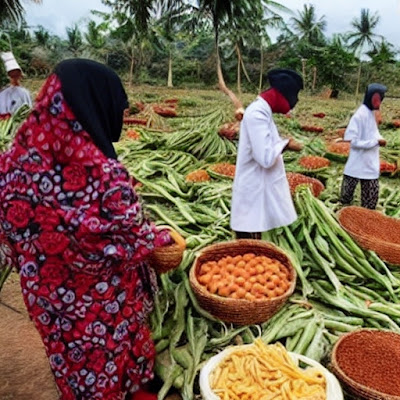Zero Hunger in Indonesia: A Call for Sustainable Agriculture and Nutrition
Zero Hunger in Indonesia: A Call for Sustainable Agriculture and Nutrition
Indonesia, the fourth most populous country in the world, has made significant strides in reducing poverty and improving food security in recent years. However, despite these achievements, millions of Indonesians still suffer from hunger and malnutrition. In fact, according to the Food and Agriculture Organization (FAO), around 19.4 million people in Indonesia were undernourished in 2020, accounting for almost 7% of the total population.
Achieving zero hunger is one of the United Nations' Sustainable Development Goals (SDGs), and it requires a comprehensive and sustainable approach to agriculture, food systems, and nutrition. Indonesia has taken several steps to address these challenges and move towards a hunger-free future, but much more needs to be done.
Challenges and Solutions
The key challenges facing Indonesia in achieving zero hunger include poverty, inadequate infrastructure, climate change, and a lack of access to nutritious and affordable food. The country's vast geography, with its thousands of islands, makes it difficult to provide equal access to food and nutrition across the country. In addition, the majority of the population depends on agriculture for their livelihoods, which is often characterized by low productivity, poor land management practices, and limited access to finance and technology.
To address these challenges, the government of Indonesia has adopted several policies and programs that focus on improving agricultural productivity, promoting sustainable agriculture, and increasing access to nutritious food. For example, the government launched the Food Security Agency in 2013, which aims to coordinate and implement food security programs across the country. In addition, the government has implemented the National Movement of Food Resilience (Gerakan Nasional Pangan Mandiri) to promote self-sufficiency in food production and to increase the availability of food in the market.
Furthermore, the Indonesian government has implemented a variety of agricultural programs, such as the Program of Rice Intensification (Program Intensifikasi Padi), which promotes sustainable and efficient rice cultivation. The government has also launched the Family Farming Program (Program Usaha Tani Perdesaan), which provides smallholder farmers with access to credit, training, and technology to improve their productivity and livelihoods.
In addition, Indonesia has implemented various policies and programs to address malnutrition and improve nutrition outcomes. The government launched the National Nutrition Communication Strategy (Strategi Komunikasi Gizi Nasional) in 2013, which aims to improve public awareness and education on nutrition. Furthermore, the government has implemented the National Food Fortification Program (Program Pemantapan Gizi Masyarakat), which aims to increase the availability and consumption of fortified food products, such as iodized salt, fortified rice, and fortified cooking oil.
The Role of Sustainable Agriculture
Sustainable agriculture is a key element in achieving zero hunger in Indonesia. It not only helps to increase agricultural productivity but also contributes to climate change mitigation and adaptation, biodiversity conservation, and rural development. Sustainable agriculture practices, such as agroforestry, conservation agriculture, and integrated pest management, can improve soil health, water management, and crop yields while reducing the use of pesticides and fertilizers.
In addition, sustainable agriculture practices can improve the livelihoods of smallholder farmers by providing them with diversified income sources, access to credit and markets, and reducing their vulnerability to climate change impacts. Furthermore, sustainable agriculture can help to address the challenges of food security and malnutrition by increasing the availability and affordability of nutritious food.
Indonesia has recognized the importance of sustainable agriculture and has launched several initiatives to promote it. For example, the government has implemented the Sustainable Agriculture and Rural Development Program (Program Pembangunan Pertanian Berkelanjutan dan Perdesaan), which provides farmers

Comments
Post a Comment